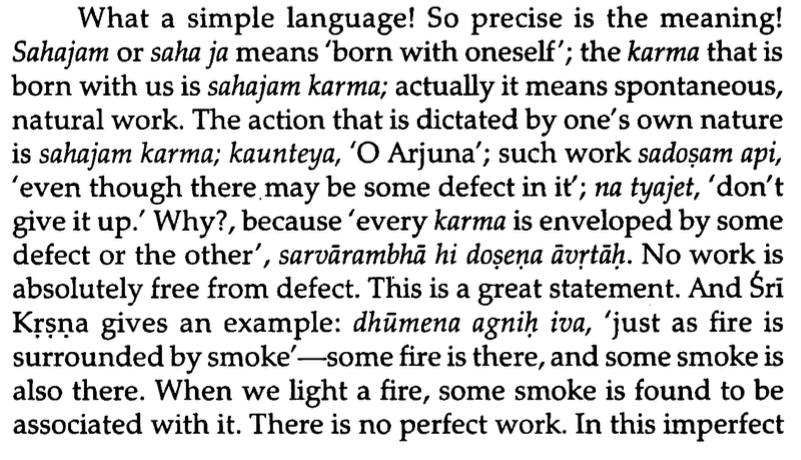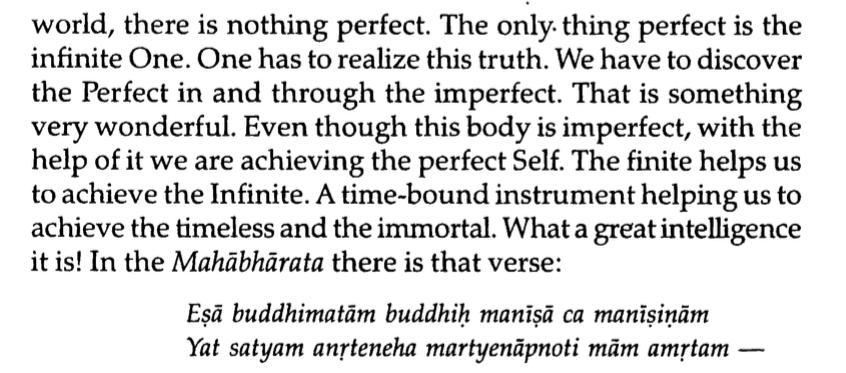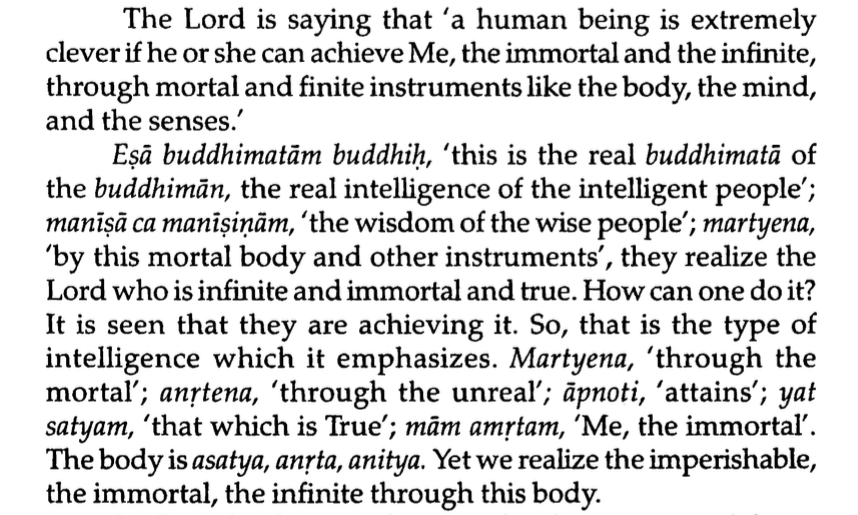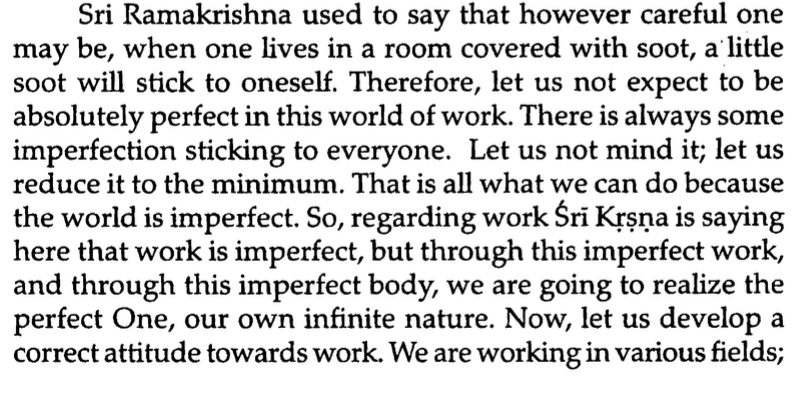bhagavad gita
| Speech | Tapas | Sahaj Karma | Sahaj Karma Page |
| Quality of Females |
| Control of Mind |
Chapter 18 | Chapter 17 |
Swami Ranganathananda
Books
Selected Verses
कार्पण्यदोषोपहतस्वभावः पृच्छामि त्वां धर्मसंमूढचेताः।
यच्छ्रेयः स्यान्निश्र्चितं ब्रूहि तन्मे शिष्यस्तेऽहं शाधि मां त्वां प्रपन्नम्।।2.7।।
With my nature overpowered by weak commiseration, with a mind bewildered about duty, I supplicate You. Tell me for certain that which is better; I am Your disciple. Instruct me who have taken refuge in You.
नात्यश्नतस्तु योगोऽस्ति न चैकान्तमनश्नतः।
न चातिस्वप्नशीलस्य जाग्रतो नैव चार्जुन।।6.16।।
But, O Arjuna, Yoga is not for one who eats too much, nor for one who does not eat at all; neither for one who habitually sleeps too long, nor surely for one who keeps awake.
युक्ताहारविहारस्य युक्तचेष्टस्य कर्मसु।
युक्तस्वप्नावबोधस्य योगो भवति दुःखहा।।6.17।।
Yoga becomes a destroyer of sorrow of one whose eating and movements are regulated, whose effort in works is moderate, and whose sleep and wakefulness are temperate.
त्रिविधं नरकस्येदं द्वारं नाशनमात्मनः। कामः क्रोधस्तथा लोभस्तस्मादेतत्त्रयं त्यजेत्।।16.21।।
This door of hell, which is the destroyer of the soul, is of three kinds-passion, anger and also greed. Therefore one should forsake these three.
तस्माच्छास्त्रं प्रमाणं ते कार्याकार्यव्यवस्थितौ।
ज्ञात्वा शास्त्रविधानोक्तं कर्म कर्तुमिहार्हसि।।16.24।।
English Translation By Swami Gambirananda
16.24 Therefore, the scripture is your authority as regards the determination of what is to be done and what is not to be done. After understanding (your) duty as presented by scriptural injunction, you ought to perform (your duty) here.
Chapter 17
अनुद्वेगकरं वाक्यं सत्यं प्रियहितं च यत्।
स्वाध्यायाभ्यसनं चैव वाङ्मयं तप उच्यते।।17.15।।
That speech which causes no pain, which is true, agreeable and beneficial; as well as the practice of study of the scriptures,-is said to be austerity of speech.
ब्राह्मणक्षत्रियविशां शूद्राणां च परंतप। कर्माणि प्रविभक्तानि स्वभावप्रभवैर्गुणैः।।18.41।।
O scorcher of enemies, the duties of the Brahmanas, the Ksatriyas and the Vaisyas, as also of the Sudras have been fully classified according to the gunas born from Nature.
In all societies, we find people pursuing different occupations impelled by their own psychological nature or temperament.
Svabhava : Sva Bhava : One’s own nature.
We have got a fund of psychic energy in us . That energy will incline us to a particular work, and a particular mode of life
शमो दमस्तपः शौचं क्षान्तिरार्जवमेव च।ज्ञानं विज्ञानमास्तिक्यं ब्रह्मकर्म स्वभावजम्।।18.42।।
The natural duties of the Brahmanas are the control of the internal and external organs, austerity, purity, forgiveness, straightforwardness, knowledge as also wisdom [Knowledge refers to the understanding of subjects presented by the scriptures; wisdom means making them matters of one’s own experience.] and faith.
शम, दम, तप, शौच, क्षान्ति, आर्जव, ज्ञान, विज्ञान और आस्तिक्य – ये ब्राह्मण के स्वाभाविक कर्म हैं।।
शौर्यं तेजो धृतिर्दाक्ष्यं युद्धे चाप्यपलायनम्।दानमीश्वरभावश्च क्षात्रं कर्म स्वभावजम्।।18.43।।
शौर्य, तेज, धृति, दाक्ष्य (दक्षता), युद्ध से पलायन न करना, दान और ईश्वर भाव (स्वामी भाव) – ये सब क्षत्रिय के स्वाभाविक कर्म हैं।।
The natural duties of the Ksatriyas are heroism, boldness, fortitude, capability, and also not retreating from battle, generosity and lordliness.
कृषिगौरक्ष्यवाणिज्यं वैश्यकर्म स्वभावजम्।
परिचर्यात्मकं कर्म शूद्रस्यापि स्वभावजम्।।18.44।।
कृषि, गौपालन तथा वाणिज्य – ये वैश्य के स्वाभाविक कर्म हैं, और शूद्र का स्वाभाविक कर्म है परिचर्या अर्थात् सेवा करना।।
The natural duties of the Vaisyas are agriculture, cattle-rearing and trade. Of the Sudras, too, the natural duty is in the form of service.
स्वे स्वे कर्मण्यभिरतः संसिद्धिं लभते नरः।
स्वकर्मनिरतः सिद्धिं यथा विन्दति तच्छृणु।।18.45।।
अपने-अपने स्वाभाविक कर्म में अभिरत मनुष्य संसिद्धि को प्राप्त कर लेता है। स्वकर्म में रत मनुष्य किस प्रकार सिद्धि प्राप्त करता है, उसे तुम सुनो।।
Being devoted to his own duty, man attains complete success. Hear that as to how one devoted to his own duty achieves success.
यतः प्रवृत्तिर्भूतानां येन सर्वमिदं ततम्।स्वकर्मणा तमभ्यर्च्य सिद्धिं विन्दति मानवः।।18.46।।
जिस (परमात्मा) से भूतमात्र की प्रवृत्ति अर्थात् उत्पत्ति हुई है और जिससे यह सम्पूर्ण जगत् व्याप्त है, उस (परमात्मा) की स्वकर्म द्वारा पूजा करके मनुष्य सिद्धि को प्राप्त होता है।।
A human being achieves success by adoring through his own duties Him from whom is the origin of creatures, and by whom is all this pervaded.
श्रेयान्स्वधर्मो विगुणः परधर्मात्स्वनुष्ठितात्।स्वभावनियतं कर्म कुर्वन्नाप्नोति किल्बिषम्।।18.47।।
सम्यक् अनुष्ठित परधर्म की अपेक्षा गुणरहित स्वधर्म श्रेष्ठ है। (क्योंकि) स्वभाव से नियत किये गये कर्म को करते हुए मनुष्य पाप को नहीं प्राप्त करता।।
One’s own duty, (though) defective, is superior to another’s duty well performed. By performing a duty as dictated by one’s own nature, one does not incur sin.
सहजं कर्म कौन्तेय सदोषमपि न त्यजेत्।सर्वारम्भा हि दोषेण धूमेनाग्निरिवावृताः।।18.48।।
हे कौन्तेय ! दोषयुक्त होने पर भी सहज कर्म को नहीं त्यागना चाहिए; क्योंकि सभी कर्म दोष से आवृत होते है, जैसे धुयें से अग्नि।।
O son of Kunti, one should not give up the duty to which one is born, even though it be faulty. For all undertakings are surrounded with evil, as fire is with smoke.
स्वभावजेन कौन्तेय निबद्धः स्वेन कर्मणा। कर्तुं नेच्छसि यन्मोहात्करिष्यस्यवशोऽपि तत्।।18.60।।
Being bound by your own duty born of nature, O son of Kunti, you, being helpless, will verily do that which you do not wish to do owing to indiscrimination.
Bound by your own karma , born of one’s svabahava
Avasha : Helplessly
When we want to cut wood , we cut along the grain of the wood , then it is easier to cut wood . Similarly we also have to find out our own samskakra and work it out.
Source : Gita Supersite
Online Resources
Verses at random
या निशा सर्वभूतानां तस्यां जागर्ति संयमी | यस्यां जाग्रति भूतानि सा निशा पश्यतो मुने: || 69|
ईश्वरः सर्वभूतानां हृद्देशेऽर्जुन तिष्ठति। भ्रामयन्सर्वभूतानि यन्त्रारूढानि मायया।।18.61
O Arjuna, the Lord resides in the region of the heart of all creatures, revolving through Maya all the creatures (as though) mounted on a machine!
Date wise
Page 301
ब्राह्मणक्षत्रियविशां शूद्राणां च परंतप।
कर्माणि प्रविभक्तानि स्वभावप्रभवैर्गुणैः।।18.41।।
शमो दमस्तपः शौचं क्षान्तिरार्जवमेव च।
ज्ञानं विज्ञानमास्तिक्यं ब्रह्मकर्म स्वभावजम्।।18.42।।
शौर्यं तेजो धृतिर्दाक्ष्यं युद्धे चाप्यपलायनम्।
दानमीश्वरभावश्च क्षात्रं कर्म स्वभावजम्।।18.43।।
कृषिगौरक्ष्यवाणिज्यं वैश्यकर्म स्वभावजम्।
परिचर्यात्मकं कर्म शूद्रस्यापि स्वभावजम्।।18.44।।
स्वे स्वे कर्मण्यभिरतः संसिद्धिं लभते नरः।
स्वकर्मनिरतः सिद्धिं यथा विन्दति तच्छृणु।।18.45।।
यतः प्रवृत्तिर्भूतानां येन सर्वमिदं ततम्।
स्वकर्मणा तमभ्यर्च्य सिद्धिं विन्दति मानवः।।18.46।।
श्रेयान्स्वधर्मो विगुणः परधर्मात्स्वनुष्ठितात्।
स्वभावनियतं कर्म कुर्वन्नाप्नोति किल्बिषम्।।18.47।।
सहजं कर्म कौन्तेय सदोषमपि न त्यजेत्।
सर्वारम्भा हि दोषेण धूमेनाग्निरिवावृताः।।18.48।।
असक्तबुद्धिः सर्वत्र जितात्मा विगतस्पृहः।
नैष्कर्म्यसिद्धिं परमां संन्यासेनाधिगच्छति।।18.49।।
सिद्धिं प्राप्तो यथा ब्रह्म तथाप्नोति निबोध मे।
समासेनैव कौन्तेय निष्ठा ज्ञानस्य या परा।।18.50।।
Date 22 Dec 2021
https://shlokam.org/gitadhyanam/
The prayer verses were written by a great acharya by name Madhusudana Saraswati before he wrote his commentary on the Bhagavad Gita. The name of his commentary is called Gudhartha Dipika, a lamp which illumines the hidden and deeper meanings of the Bhagavad Gita. It is a very famous commentary on the Gita. Before starting the actual Gita we study of the nine verses of Dhyana Sloka written by this Acharya.
In these verses the Acharya offers Namaskarams to Mahabharatam (for it is the greatest book), Bhagavad Gita (looking upon Gita as mother Saraswati the embodiment of wisdom), Vyasacharya (the author of Mahabharatam and therefore the author of Gita also), and Krishna (who gives the Gita teaching to Arjuna).
This was what I was reading today around 7 am
Sahaj Karma
Sahaj Karma : Gita
सहजं कर्म कौन्तेय सदोषमपि न त्यजेत्। सर्वारम्भा हि दोषेण धूमेनाग्निरिवावृताः।।18.48।।







Gita Study | Dhyana Slokas | Gita Shlokas |
Online Classes